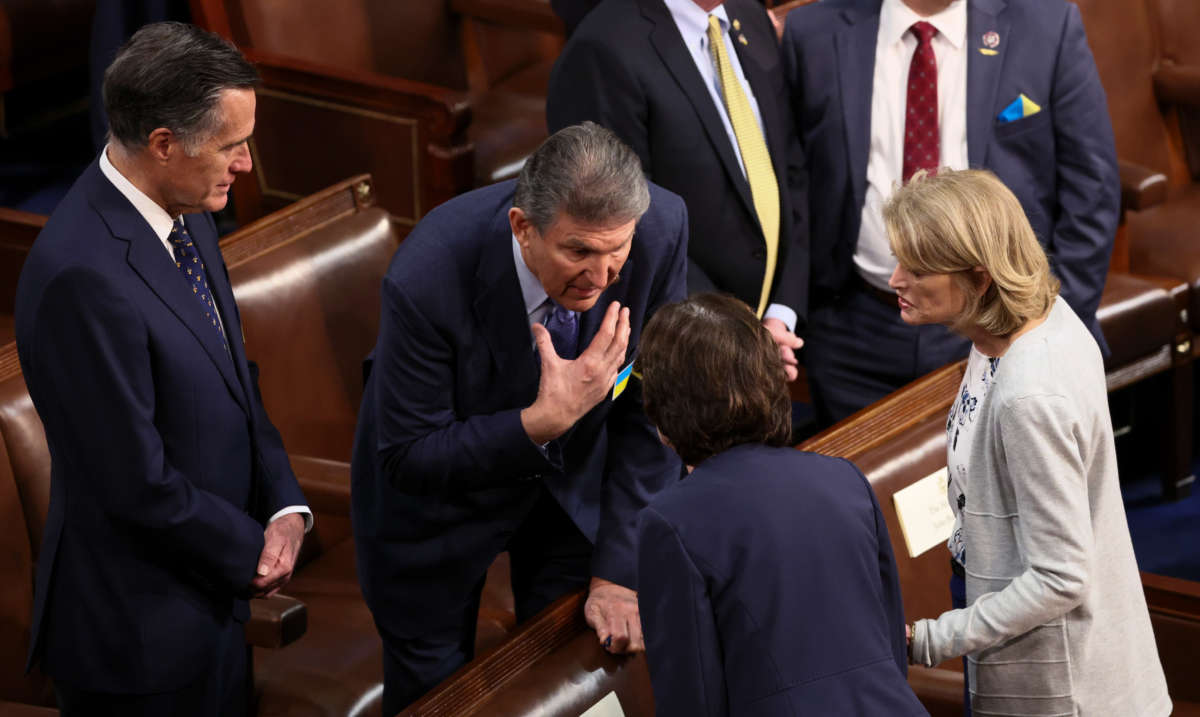Support justice-driven, accurate and transparent news — make a quick donation to Truthout today!
Conservative Democrat and coal baron Sen. Joe Manchin (West Virginia) has announced that he is opposed to President Joe Biden’s nomination of Sarah Bloom Raskin to the Federal Reserve board, throwing uncertainty into whether she will have enough votes to be confirmed by the Senate.
In a statement, Manchin said that he is “unable” to support Raskin’s nomination. “Her previous public statements have failed to satisfactorily address my concerns about the critical importance of financing an all-of-the-above energy policy to meet our nation’s critical energy needs,” he said, implying that Raskin’s views on climate are “politicize[d].”
Manchin has offered few other concrete reasons for his opposition to Raskin. But notably, the lawmaker makes millions of dollars off of coal companies that he founded in the 1980s, and has received many times more money from the oil and gas industry in this election cycle than any other member of Congress, despite not being up for reelection until 2024.
Raskin, who is nominated to be the Fed’s top banking regulator, is a progressive favorite. She has been hailed as a climate champion for her stances that the Fed should be tough on the fossil fuel industry and that the agency should take the risks that the climate crisis poses to the country’s finances seriously; early in the pandemic, the former deputy secretary of the Treasury Department warned the Fed that it shouldn’t give subsidies to the fossil fuel industry, which was already volatile even before the pandemic.
“The coronavirus pandemic has laid bare just how vulnerable the United States is to sudden, catastrophic shocks,” Raskin wrote in an op-ed for The New York Times in May of 2020. “Climate change poses the next big threat. Ignoring it, particularly to the benefit of fossil fuel interests, is a risk we can’t afford.”
Because Republicans are staunchly opposed to Raskin, it’s possible that her nomination is doomed. Sen. Susan Collins (R-Maine), who is also cozy with the oil and gas industry, told reporters on Monday that there isn’t a path forward for Raskin’s nomination.
Like Manchin, Republicans have claimed that Raskin’s views are too politicized for the Fed. In fact, the party is so opposed to her that the 12 Republicans on the Senate Banking Committee boycotted the vote to advance her nomination, rather than simply voting ‘no.’ Experts described the move to lengthen the amount of time that the Fed board would be vacant as “an enormous dereliction of duty,” especially given the magnitude of the country’s current economic crises, economist Joseph Stiglitz told The New Yorker.
The fossil fuel industry has poured lobbying money into opposing Raskin’s nomination. GOP lawmakers have no objections to the renomination of Republican Fed Chair Jerome Powell, who has largely not taken climate risks into account in decision-making despite the huge risks in ignoring its impacts on the economy.
The real politicization of Raskin’s nomination seems to be coming from climate denying conservatives like Manchin, who are vehemently opposed to taking action to combat the climate crisis. Experts say that Raskin’s views are far from extreme or partisan — in fact, many financial institutions are already taking climate into consideration.
“Her views are in the mainstream,” Steven Rothstein, managing director of the Ceres Accelerator for Sustainable Capital Markets, told HuffPost. “There are over 100 central banks around the world that are part of the Network for Greening the Financial System. They’re all saying climate is a risk. Our current chair of the Federal Reserve says climate is a risk.”
Press freedom is under attack
As Trump cracks down on political speech, independent media is increasingly necessary.
Truthout produces reporting you won’t see in the mainstream: journalism from the frontlines of global conflict, interviews with grassroots movement leaders, high-quality legal analysis and more.
Our work is possible thanks to reader support. Help Truthout catalyze change and social justice — make a tax-deductible monthly or one-time donation today.
